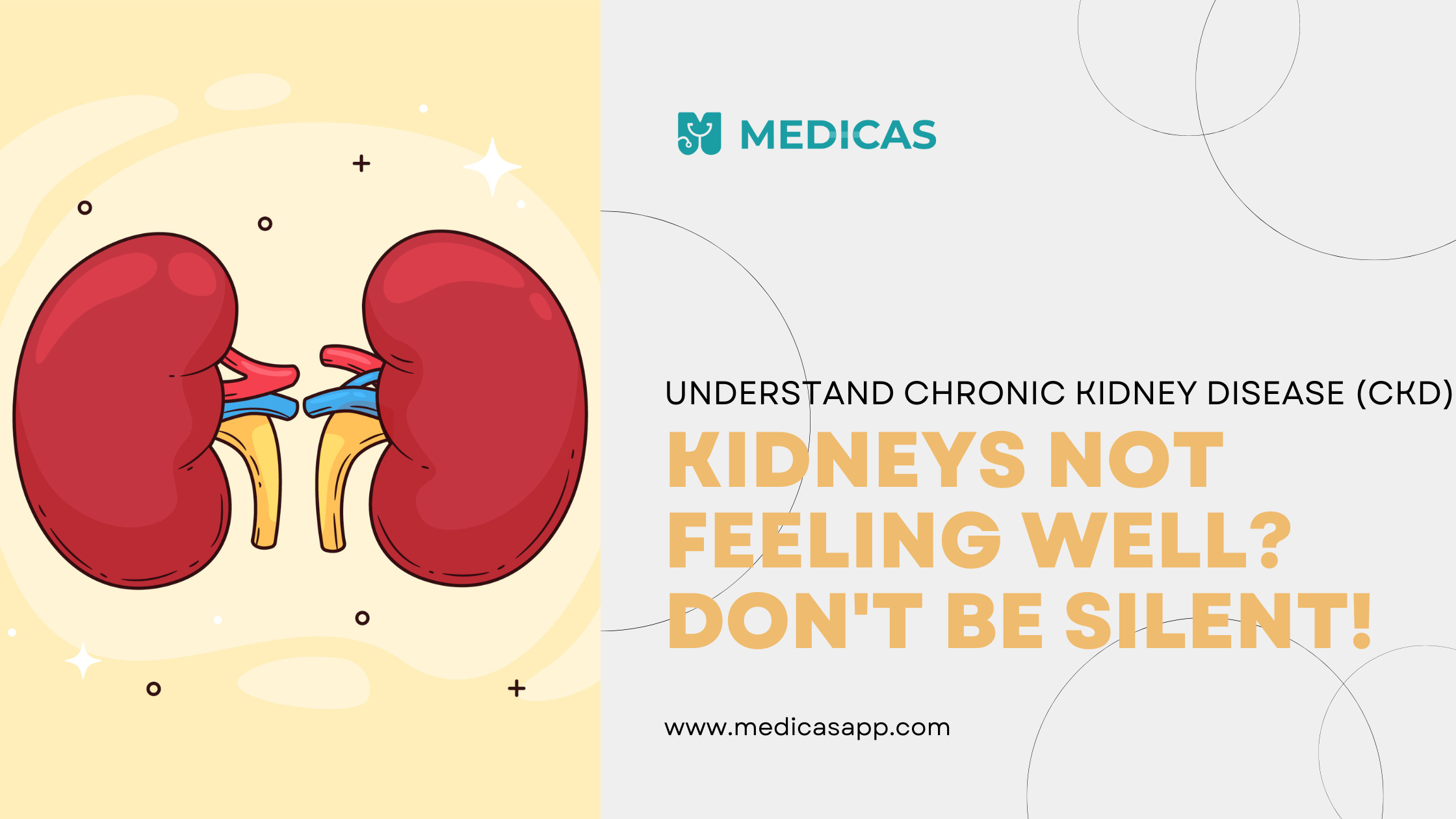What is Chronic Kidney Disease?
Chronic kidney disease, often abbreviated as CKD, refers to the gradual loss of kidney function over time. The kidneys, vital organs responsible for filtering waste products and excess fluids from the blood, play a pivotal role in maintaining overall health. When kidney function declines, waste accumulates in the body, leading to complications. Understanding the factors contributing to CKD is crucial for early detection and intervention.
Causes of Chronic Kidney Disease
- Diabetes: Uncontrolled diabetes is one of the leading causes of CKD. High blood sugar levels over time can damage the blood vessels in the kidneys, impairing their function.
- Hypertension (High Blood Pressure): Chronic high blood pressure can strain the kidneys’ blood vessels, leading to kidney damage.
- Glomerulonephritis: Inflammation of the kidney’s filtering units (glomeruli) can cause CKD. This condition may be due to infections, autoimmune diseases, or other factors.
- Polycystic Kidney Disease (PKD): Polycystic Kidney Disease (PKD) is an inherited disorder characterized by the growth of cysts in the kidneys, leading to kidney damage over time.
- Recurrent Kidney Infections: Frequent or severe kidney infections can cause scarring and damage to kidney tissue, leading to CKD.
- Vesicoureteral Reflux (VUR): VUR is a condition where urine flows backward from the bladder into the kidneys, increasing the risk of kidney infections and potential kidney damage.
- Other Factors: Other factors contributing to CKD include obesity, smoking, aging, family history of kidney disease, and certain medications.
Read more : Understanding Diabetes: Causes, Types, and Risk Factors
Symptoms of Chronic Kidney Disease
Early stages of CKD may not present noticeable symptoms. As the condition progresses, symptoms may include:
- Fatigue
- Swelling in the ankles, feet, or hands
- Foamy urine
- Changes in urination frequency or color
- Persistent itching
- Nausea and vomiting
- Shortness of breath
- High blood pressure
What are the 5 Stages of CKD?
Chronic kidney disease (CKD) is typically classified into five stages based on the level of kidney function, measured by the glomerular filtration rate (GFR) and the presence of kidney damage. These stages help determine the severity of the condition and guide treatment decisions:
- Stage 1: Kidney damage with normal or slightly increased GFR (≥90 mL/min/1.73 m²). In this stage, there may be evidence of kidney damage, such as proteinuria (protein in the urine), but kidney function is still relatively normal.
- Stage 2: Mildly reduced kidney function (GFR 60-89 mL/min/1.73 m²). Kidney damage and mild reduction in kidney function may be present, but symptoms are often absent or mild.
- Stage 3: Moderately reduced kidney function (GFR 30-59 mL/min/1.73 m²). In stage 3, kidney function is significantly reduced, and symptoms may become more noticeable. Treatment aims to slow the progression of CKD and manage complications.
- Stage 4: Severely reduced kidney function (GFR 15-29 mL/min/1.73 m²). Kidney function is markedly impaired in stage 4, leading to an increased risk of complications such as fluid retention, electrolyte imbalances, and cardiovascular disease. Preparation for kidney replacement therapy (dialysis or transplant) may begin at this stage.
- Stage 5: Kidney failure or end-stage renal disease (ESRD) (GFR <15 mL/min/1.73 m²). In stage 5 CKD, kidney function is severely compromised, and the kidneys can no longer adequately filter waste products and excess fluids from the blood. Dialysis or kidney transplantation is necessary to sustain life.
What are the Complications of CKD?
Chronic kidney disease (CKD) can lead to various complications affecting different parts of the body due to the kidneys’ essential functions in maintaining overall health. Some common complications of CKD include:
1. Cardiovascular Disease: CKD significantly increases the risk of developing heart disease, including coronary artery disease, heart attack, and heart failure. This is due to factors such as high blood pressure, fluid overload, electrolyte imbalances, and inflammation associated with kidney dysfunction.
2. Fluid Retention and Edema: Impaired kidney function can lead to fluid retention, resulting in swelling (edema) in the legs, ankles, feet, and around the eyes. Excess fluid can also accumulate in the lungs, leading to shortness of breath.
3. Electrolyte Imbalances: The kidneys play a crucial role in maintaining the body’s electrolyte balance. In CKD, electrolyte imbalances, such as high potassium (hyperkalemia), high phosphate (hyperphosphatemia), and low calcium (hypocalcemia), can occur, leading to various complications, including muscle weakness, irregular heartbeats, and bone disorders.
4. Anemia: CKD often leads to a decrease in the production of erythropoietin, a hormone involved in red blood cell production. This can result in anemia, characterized by fatigue, weakness, shortness of breath, and pale skin.
5. Bone and Mineral Disorders: CKD can disrupt the body’s ability to maintain healthy bones and mineral balance. This can lead to bone loss, fractures, and bone pain due to conditions such as renal osteodystrophy and secondary hyperparathyroidism.
6. Cardiovascular Complications: CKD increases the risk of developing high blood pressure, which can further damage the kidneys and exacerbate cardiovascular complications. Individuals with CKD are also at higher risk of stroke, peripheral artery disease, and other vascular conditions.
7. Neurological Complications: CKD can affect the nervous system, leading to symptoms such as cognitive impairment, difficulty concentrating, peripheral neuropathy (nerve damage), and restless legs syndrome.
8. Fluid and Electrolyte Imbalance: CKD can disrupt the balance of fluids and electrolytes in the body, leading to conditions such as hyperkalemia (high potassium levels), hyperphosphatemia (high phosphate levels), and metabolic acidosis.
9. End-Stage Renal Disease (ESRD): Without appropriate management, CKD can progress to end-stage renal disease (ESRD), where the kidneys fail to function adequately to sustain life. ESRD requires kidney replacement therapy, such as dialysis or kidney transplantation, to maintain survival.
Overall, managing CKD involves addressing its complications through a combination of medical treatment, lifestyle modifications, and close monitoring by best nephrologists in india. Early detection and intervention are crucial in preventing or delaying the progression of CKD and reducing the risk of complications.
Treatment Options for Chronic Kidney Disease
While there is no permanent cure for CKD, treatment aims to slow its progression, manage symptoms, and prevent complications. Treatment options may include:
- Medications: Your doctor may prescribe medications to control blood pressure, manage blood sugar levels (if diabetic), lower cholesterol, or treat underlying conditions contributing to CKD.
- Lifestyle Modifications: Adopting a healthy lifestyle can help manage CKD. This includes following a balanced diet low in salt, potassium, and phosphorus, maintaining a healthy weight, regular exercise, quitting smoking, and limiting alcohol consumption.
- Dialysis: In advanced stages of CKD where kidney function is severely impaired, dialysis may be necessary. Dialysis helps remove waste products and excess fluids from the blood artificially.
- Kidney Transplant: For eligible candidates, kidney transplantation offers the best long-term treatment option. A healthy kidney from a donor is surgically implanted to replace the failed kidneys.
Watch now
Conclusion
Chronic kidney disease is a progressive condition that requires early detection and management to prevent complications and improve outcomes. Full body checkup at home, monitoring of kidney function, and adherence to treatment plans are essential for individuals living with CKD. By understanding the causes, symptoms, and available treatment options, individuals can take proactive steps to manage their kidney health and enhance their overall well-being.
Other Healthcare Blogs:
The Importance of Full body checkup for a Woman
The Ultimate Pregnancy Diet Chart: Nourishing You and Your Little Bundle!
Natural Solutions to Prevent Pregnancy After a Missed Period
5 Safe and Effective Ways to Start Your Period Naturally: Methods and Risks Explained
Emergency Contraceptive Pills Side Effects: What Every Woman Needs to Know
Is Infertility Genetic? Exploring the Role of Genetics in Reproductive Challenges
Pregnancy Symptoms: Early Signs That You Might Notice
Disclaimer:
Medical Advice: The information provided in this blog post is for educational purposes only and should not be considered as a substitute for professional medical advice, diagnosis, or treatment. Always consult with a qualified healthcare professional for personalized guidance regarding your specific medical condition.
Accuracy of Information: While we strive to provide accurate and up-to-date information, the field of medicine and viral fevers is constantly evolving. The content in this blog post may not reflect the most current research or medical guidelines. Therefore, it is advisable to cross-check any information provided with reliable sources or consult a healthcare professional.
Individual Variations: The symptoms, causes, treatment options, and preventive measures discussed in this blog post are general in nature and may not apply to everyone. It is important to remember that each individual’s situation is unique, and personalized medical advice should be sought when making healthcare decisions.
External Links: This blog post may contain links to external websites or resources for additional information. However, we do not endorse or have control over the content of these third-party websites. Accessing these links is done at your own risk, and we are not responsible for any consequences or damages that may arise from visiting these external sources.
Results May Vary: The effectiveness of treatment options or preventive measures mentioned in this blog post may vary from person to person. What works for one individual may not work the same way for another. It is essential to consult with a healthcare professional for personalized advice tailored to your specific needs.

Dr. Murali serves as the Chief Medical Officer at EGS Health, bringing over 18 years of experience as a general practitioner to his role. He also directs Special Projects & Development at the Central America Health Sciences University, Belize Medical College. Dr. Murali holds an MD and a PG Cert in Health Profession Education (HPE) and has been an active contributor to the medical field since 2001. His career began in the Tobacco Cessation Program and the Border Family Welfare Programs in conjunction with PAHO in Ciudad Juarez, where he also published research on the impact of technology on healthcare education. He later became a clinical coordinator for clerkships, forging partnerships between students and hospitals that now serve as clinical sites for the university. Dr. Murali has furthered his expertise through advanced training, including the Leaders in Healthcare Education course at Harvard Macy Institute and the Health Professions Certification Program at Keele University, enhancing his influence in both medical education and healthcare delivery, both locally and internationally.


